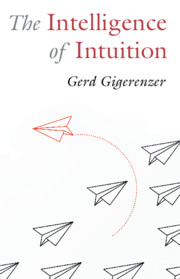Book contents
- The Intelligence of Intuition
- The Intelligence of Intuition
- Copyright page
- Dedication
- Contents
- Figures and Tables
- Preface
- Acknowledgments
- Chapter 1 We Know More Than We Can Tell
- Part I The War on Intuition
- Chapter 2 Female Intuition Versus Male Reason
- Chapter 3 Biases: Mistaking Intuition for Irrationality
- Chapter 4 Governmental and Technological Paternalism
- Part II Intuition and Its Intelligence
- References
- Index
Chapter 4 - Governmental and Technological Paternalism
from Part I - The War on Intuition
Published online by Cambridge University Press: 28 September 2023
- The Intelligence of Intuition
- The Intelligence of Intuition
- Copyright page
- Dedication
- Contents
- Figures and Tables
- Preface
- Acknowledgments
- Chapter 1 We Know More Than We Can Tell
- Part I The War on Intuition
- Chapter 2 Female Intuition Versus Male Reason
- Chapter 3 Biases: Mistaking Intuition for Irrationality
- Chapter 4 Governmental and Technological Paternalism
- Part II Intuition and Its Intelligence
- References
- Index
Summary
Libertarian paternalists argue that psychological research has shown that intuition is systematically flawed and we are hardly educable because our cognitive biases resemble stable visual illusions. Thus, they maintain, authorities who know what is best for us need to step in and steer our behavior with the help of nudges. Nudges are nothing new; justifying them on the basis of a latent irrationality is. Technological paternalism is government by algorithms, with tech companies and state governments using digital technology to predict and control citizens’ behavior. This philosophy claims first that AI is, or soon will be, superior to human intuition in all respects; second, people should defer to algorithms’ recommendations. I contend that algorithms and big data can outperform humans in tasks that are well-defined and stable, e.g., playing chess and working on assembly lines, but not in ill-defined and unstable tasks, e.g., finding the best mate and predicting human behavior. Misleadingly, the “dataist” worldview promotes algorithms as if these were omniscient beings and so people should allow them to decide for the good of each what job to accept, whom to marry, and whom to vote for.
Keywords
- Type
- Chapter
- Information
- The Intelligence of Intuition , pp. 68 - 88Publisher: Cambridge University PressPrint publication year: 2023



